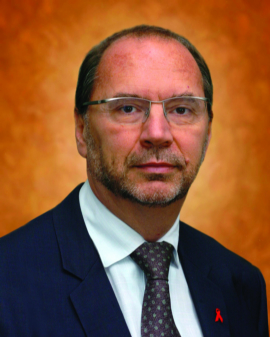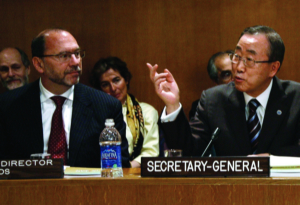An Interview with Peter Piot—Change at UNAIDS: Peter Piot Moves On
March 2009—Lauded for his work as a scientist, physician, and public health leader, Dr. Peter Piot stepped down as executive director of UNAIDS in December 2008. He had been at its helm since the founding of UNAIDS in 1995. Dr. Piot is credited with co-discovering the Ebola virus in 1976, and he is widely recognized for having established the foundation of our understanding of AIDS in Africa. In this interview, Dr. Piot reflects on his tenure at UNAIDS, discusses the impact of the global recession on HIV/AIDS, and considers the direction of the epidemic in Asia and around the world.
TREAT Asia Report: Many expect the global economy to get worse before it gets better. Are you concerned that this could lead to a depletion of resources for HIV programs and a reversal in some of the gains we've made in the last few years?
Dr. Peter Piot: I think we should be realistic about the potential impact of the financial and economic crisis. The incomes of the world's biggest governments are declining and expenditures are going up because of financial efforts to save the economy, which means that government budgets will face constraints. We have to be sure that this is not going to result in cutting AIDS programs. I'm not saying that's going to happen, but it's a risk that means we will have to be extremely vigilant. The impact of the financial crisis on the spread of HIV is not clear. What we've seen in Asia, in countries like Viet Nam and even in China, is that economic growth and increased wealth have been associated with the spread of HIV—rather than poverty—because more disposable income generates greater opportunities for sex and drugs. Where the impact could be the most immediate is among HIV-positive lower middle-income people or those who fall into poverty. Access to HIV treatment, care, and support could become more difficult because of increasing poverty and less access to public services. It may be a bit early, but what's clear to me is that decisions that are being made today, in terms of how to respond to the economic crisis, will have a far-reaching impact.
TA Report: China and India account for roughly one-third of the world's population. A few years ago there was much concern that the HIV epidemics in these two countries would explode but that doesn't appear to have happened. Are you fairly confident that we've averted a catastrophe in China and India, or should we still be extremely vigilant?

Dr. Peter Piot |
Dr. Piot: First of all, there are populations in India and China with very high HIV prevalence rates—among them sex workers in some areas in Karnataka and Andhra Pradesh in India, and injecting drug users all over China and East Asia. We're also seeing new, very rapidly rising epidemics among gay men and men who have sex with men [MSM].
India's overall prevalence rate is relatively low, which gives the impression that there's no problem, but HIV doesn't have a normal distribution in the statistical sense. As I said, it's concentrated among groups such as MSM, sex workers, and injecting drug users, and there the numbers are bad. In Asia, we need to take a long view of the epidemic. The growth of the epidemic in Asia has been slower than we anticipated, that's true, and we haven't gone into an African type of scenario in the short term. But with a denominator of one-third of the world's population, one percent in China is 13 million people and 10 million in India—more than the total population of some African countries.
One of the lessons that we've learned about AIDS is that we must expect surprises. The new epidemics among MSM all over East and Southeast Asia are a surprise but they shouldn't be. What I think is key is that the response to AIDS in both India and China has been quite good, after initial denial and hesitation. Who would have thought even five years ago that China would now have maybe 500 methadone clinics? In India, these clinics have had real, measurable results. The evolution of the AIDS epidemic is something that depends on many complex issues, one being the political context.
TA Report: You've often emphasized the link between human rights and HIV. How can we be more effective in addressing the homophobia that's such a huge barrier to preventing HIV and to establishing effective HIV interventions for MSM?
Dr. Piot: It is clear that homophobia not only constitutes discrimination against gay people and it's not only a human rights violation—it's also a major obstacle to
implementing effective AIDS programs. We need to explain that over and over again, especially in societies where homosexuality is against the law. And let's not forget, that was the case in most Western countries when I was young. I come from Belgium and when I was a teenager there, homosexuality was illegal. Now we have same-sex marriage and adoption, so things can change. But they don't change spontaneously. You have to make sure that there is pressure.
We also have to support emerging MSM groups in various countries. At UNAIDS that's something we've been doing together with amfAR. It's extremely important to push the boundaries of the system and develop a broad base of support for MSM. It can't all come from the outside, but from the outside we can support our colleagues who are fighting for their rights.
TA Report: You've been working at the Joint United Nations Programme on AIDS (UNAIDS) for 13 years and have accomplished a great deal. Is there a particular accomplishment that you're especially proud of from your tenure at UNAIDS?
Dr. Piot: I think the main achievement, if I can offer a single one, is having put AIDS at the top of political agendas and on the agenda of businesses all over the world. All the rest, in a sense, comes from there. I am also very proud that we were instrumental in reducing the price of antiretrovirals in developing countries. But I think ultimately that would not have been possible if there hadn't been political pressure and visibility.
TA Report: These days, more and more patients need to move onto second-line antiretroviral therapy, which is much more expensive than first line. What are the prospects for making those drugs affordable for large numbers of people?
Dr. Piot: With second-line drugs, we are facing the same problem we faced with first-line treatment. It's not only the price, although the price must come down. But I don't think that it's going to be that difficult this time because the toughest battles are always the first ones. Industry has seen that the markets have not collapsed and that they can still make good profits with differential prices.
But the big challenge, I think, is going to with be the middle-income countries and in Asia. For the least developed countries and the low-income countries, there is already some quite good differential lower pricing for second-line drug.
TA Report: On the research front, are you optimistic about the prospects for a vaccine or a microbicide?

Dr. Piot with United Nations Secretary-General Ban Ki-Moon in New York, March 2008. (Photo: UNAIDS/B. Hamilton) |
Dr. Piot: I think for vaccines, we're back to the drawing board. The time is ripe now for better collaboration, for exchanging information, sharing data, samples, and so on, and really rethinking how we can develop a vaccine. With microbicides, it's a matter of doing the trials. I think the key message is not to be discouraged because there wasn't a home run in terms of all these trials. It took decades to develop some of those vaccines. We were probably a bit naïve and overoptimistic about what we could achieve in the short term.
TA Report: Now you're moving onto a new challenge in London to build an institute for global health at Imperial College. What will you be able to achieve there that perhaps you weren't able to do at UNAIDS?
Dr. Piot: My intention is to apply lessons from AIDS work to other fields, not only infectious diseases but also noncommunicable diseases such as diabetes and cardiovascular diseases, which are taking on epidemic dimensions. It will be good to be back in academia to do research. And I'm very keen on transmitting my knowledge and on training a corps of new leaders, young people who are engaged in global health.
RELATED LINKS